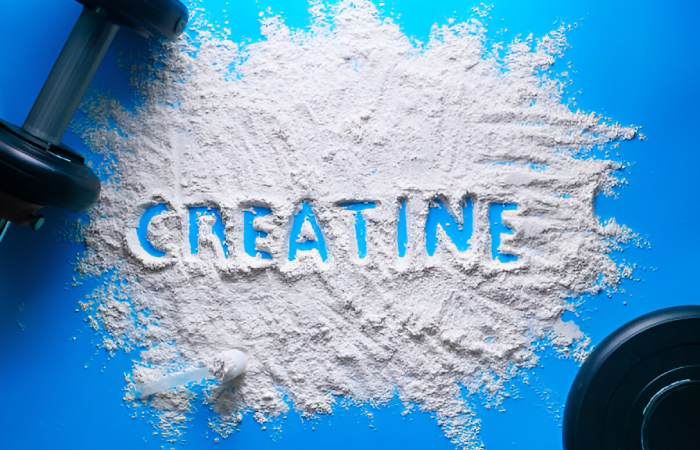Creatine, a favorite of athletes and bodybuilders and known to many thanks to pumping videos, has been enveloped in myths and legends. This leads to two widespread issues: if creatine results in acne or increases the severity of acne-related skin conditions. This article will also discuss how creatine causes acne, its side effects, and the benefits of taking this joint supplement.
What is Creatine?

Creatine is a compound that exists in your brain and muscles and is an amino acid. The liver, pancreas, and kidneys release creatine in the bloodstream, also found in seafood and red meat. Creatine monohydrate can increase physical performance in individuals consuming it in supplementary forms.
Creatine is taken by the body and transmitted into phosphocreatine, which muscles use to improve the ability to perform high-intensity bodily activities. This increases your ability to work out for a more extended period and with much more intensity, thus building muscles and improving performance. Moreover, medical research has revealed that creatine has some efficacy when used in the management of several health issues, such as some diseases of the brain and congestive heart failure.
Creatine and Acne: The Myth
The relationship between creatine and acne is false; no research data suggests that creatine worsens skin issues. Creatine can be good for the skin because it can help stave off skin problems, including sagging, wrinkles, and UV damage.
The reason for the intensity of confusion is the fact that many tend to think that creatine is an anabolic steroid that causes acne. Nonetheless, creatine cannot be termed a steroid since it is a natural amino acid, while steroids in this context are manufactured drugs in the family of testosterone.
Why the Confusion?
Another common cause of the myth is that increasing one’s capacity to exercise at a higher capacity will naturally cause more sweat. Sweating is known to block pores and may cause acne mainly because of excessive sweating. However, this is a rather indirect note, and it is crucial to note that the above side effects do not necessarily result from creatine consumption.
Other Reported Side Effects
It is believed that creatine supplementation is safe for almost every person without an exception. But it includes a few side effects:
- Weight gain
- Nausea
- Muscle cramping
- Liver damage
- Kidney stones
- Kidney damage
- Heat intolerance
- Gastrointestinal pain
- Dizziness
- Diarrhea
- Dehydration
- Compartment syndrome
- Bloating
The above side effects are uncommon and primarily observed among patients with other forms of illness. Research on the supplement reveals that creatine is safe and efficient in muscle building. Nonetheless, patients with kidney or liver issues should avoid Creatine supplements or seek the doctor’s advice before taking them.
Benefits of Taking Creatine
Creatine is, without a doubt, one of the best supplements that can be taken to help in building muscles and enhancing performance. Thus, it improves your capability to perform intensive exercises as your muscles are provided with extra energy. Muscles grow with exercise; therefore, the additional energy enables one to exercise longer and more intensely.
Creatine is more efficient for power exercise, such as weight reduction. That benefits those who exercise outside in hot temperatures, but creatine’s positive effects on cardio are somewhat less conclusive.
Beyond athletic performance, creatine may provide clinical benefits, including:
- Enhancing clinical outcomes in conditions like muscular dystrophy, Huntington’s chorea, Parkinson’s disease, and ALS in the patient population.
- They are used for treating congestive heart failure and syndromes resulting from creatine deficiency.
- Reducing cholesterol and blood sugar levels could delay the onset of type 2 diabetes.
- Reduction of bone density and how to manage NAFLD.
- Awareness of certain factors that may affect mental freshness and optimal mental performance.
- Creatine supplementation during pregnancy could enhance newborn and organ outcomes in cases of oxygen deficiency at birth and affect fetal development.
FAQs about Creatine and Acne
1: Can creatine cause acne?
A: In this case, no research proves creatine to be a causative factor for acne.
2. Is creatine a steroid?
A: NO, creatine is an amino acid, while steroids may be described as artificial versions of the male hormone testosterone.
3. Can increased sweating from workouts cause acne?
A: It is a fact that sweating leads to clogging of pores, thereby causing acne, but this is not directly attributable to the use of creatine because it leads to more complex exercises.
4. What are the common side effects of creatine?
A: Possible side effects may include but are not limited to feeling sick, having dizziness, muscle twitching, diarrhea, dehydration, weight gain, bloated belly, or stomach ache.
5. Who should avoid taking creatine?
A: Kidney and liver patients should examine their doctor before taking creatine supplements.
Conclusion
Creatine is a safe and effective supplement for muscular development and boosting performance in physical activities. Consequently, one cannot derive that creatine will lead to or exacerbate acne. However, some side effects have been known to manifest, and most of these are sensitive to the users, especially people with certain medical conditions. It is good to seek your doctor’s advice before taking supplements to avoid any risk factors that may affect you.
Disclaimer:
The information provided in this article is for educational purposes only and is not a substitute for professional medical advice. Always consult a healthcare professional before starting any new supplement, especially if you have pre-existing health conditions.